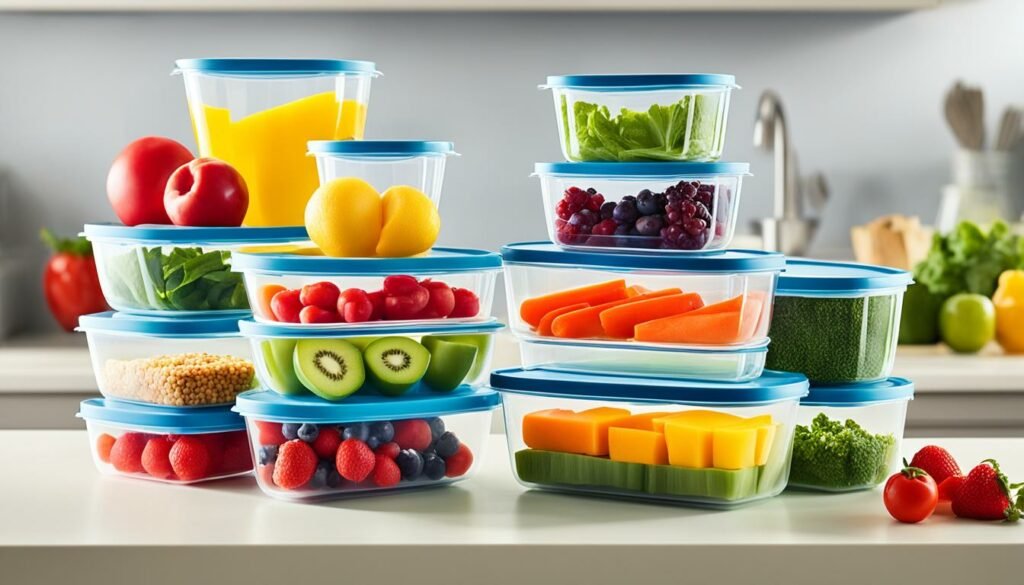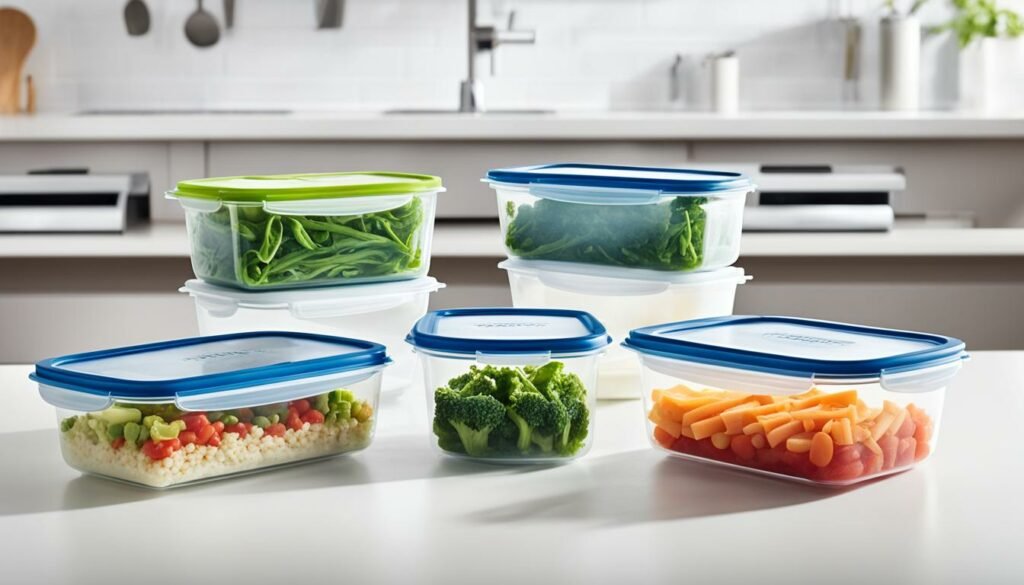Ever thought about why Tupperware has stayed popular for so long? I have. Being a long-standing Tupperware user, I’ve grown to love its benefits. It keeps food fresh and helps keep kitchens neat.

Tupperware started as simple plastic boxes. Now, it includes a whole line of airtight containers for today’s needs. Since March 2010, Tupperware in the US and Canada is free from BPA. This change makes Tupperware safe to use while keeping its high quality.
This guide will look at how Tupperware compares to other food storage methods, like vacuum sealing. We will see how these containers help keep food fresh and your kitchen tidy. Tupperware helps keep food fresh longer and stops freezer burn. It has many benefits for storing your food.
Introduction to Tupperware and Food Storage Solutions
Food storage has changed a lot over time. From just jars in pantries, we now have airtight containers that keep food fresh and safe. Let’s discover how Tupperware has changed the way we store food in modern kitchens.
The evolution of food storage
Food storage has come a long way, from ancient clay pots to current high-tech solutions. Airtight containers are key to keeping food for longer and in better quality. This progress makes meal prep easier and helps us lower waste.
Why proper food storage matters
Proper food storage has many benefits. It keeps food fresh, saves nutrients, and avoids illnesses. Choosing the right storage helps lessen food waste and keeps our dishes tasting great.
Tupperware’s role in modern kitchens
Tupperware is a big part of many kitchens. It’s known for its smart designs, perfect for leftovers or packed lunches. The airtight seal on Tupperware has changed how we keep food safely.
| Storage Need | Tupperware Solution | Benefits |
|---|---|---|
| Leftovers | Modular Mates | Stackable, airtight, space-saving |
| Meal Prep | FridgeSmart Containers | Ventilation control, extends produce life |
| Pantry Organization | Clear Mates | Transparent, airtight, pest-proof |
Tupperware leads in food storage innovation. Their products not only keep food fresh but also make kitchen organization simple. This helps with meal prep and storage.
Maintaining Food Freshness with Tupperware
Tupperware changed how we keep food fresh in our homes. These containers keep meals safe and tasty longer. Tupperware stands out in saving food’s quality and shelf life.
How Tupperware preserves food quality
The airtight seal of Tupperware makes a big difference. It keeps air and moisture out, preventing food from spoiling. With this, my food stays fresh and my leftovers have a longer life.
Extending shelf life of perishables
For fruits and veggies, Tupperware’s containers are perfect. They control moisture, which slows their ripening. This keeps my produce fresh longer, saving me money and reducing waste.
Preventing freezer burn and dehydration
Tupperware is a must for the freezer. Its tight seal stops freezer burn, preserving taste and texture. I’ve found my frozen food, from meats to baked goods, remains top-notch in Tupperware.
| Storage Method | Freshness Retention | Freezer Burn Prevention |
|---|---|---|
| Tupperware | Excellent | High |
| Plastic Bags | Fair | Low |
| Aluminum Foil | Good | Medium |
Tupperware makes storing leftovers easy and efficient. It has become a must-have in my kitchen for freshness and waste reduction.
Tupperware vs Vacuum Sealing: A Comprehensive Comparison
Both Tupperware and vacuum sealing are great for storing food. Let’s compare these two to see which is best for your kitchen.
Tupperware is great for daily use. It’s perfect for keeping leftovers fresh or for meal prep. Vacuum sealing, on the other hand, helps food last longer by removing air from bags.
Considering the cost is important. While Tupperware costs more at first, it lasts a long time. Vacuum sealing needs you to keep buying plastic bags. But, it can help save money by keeping food fresh for longer.
| Feature | Tupperware | Vacuum Sealing |
|---|---|---|
| Reusability | High | Low (bags are often single-use) |
| Air Removal | Partial | Complete |
| Versatility | Suitable for various food types | Best for dry goods and meats |
| Space Efficiency | Stackable, but bulky | Compact storage |
| Environmental Impact | Lower (reusable) | Higher (plastic bag waste) |
I find using both ways works best for me. I keep Tupperware for everyday use and vacuum sealing for saving bulk food. This mix keeps my food fresh, is affordable, and convenient.
Organization and Space-Saving Benefits of Tupperware
Tupperware changes the game in pantry organization. Their smart storage options make chaos orderly. This way, cooking becomes simpler and less stressful.
Stackable Designs for Efficient Storage
The stackable nature of Tupperware saves space. Their Heritage Collection, with 36 containers, fits everything from small leftovers to bulk dry goods. Thanks to them, I’ve learned to use even the smallest shelf spaces wisely. Now, my kitchen looks neat and easy to work in.
Color-coding and Labeling Systems
I adore Tupperware for its color codes and labels. For example, OXO’s Pop Containers let you see what’s inside. Adding dates and cooking tips on labels made my meal plans more organized.
Versatility in Kitchen and Pantry Organization
Tupperware proves invaluable for both kitchen and pantry. They offer big Vtopmart containers for lots of food and the Lock & Lock line for daily needs. Choosing quality over disposable storage truly pays off. It saves time and cuts down on trash.
| Container Type | Capacity Range | Best Use |
|---|---|---|
| Plastic | 16-32 oz | Leftovers, everyday use |
| Glass | 1.3-7.8 cups | Freezer-safe, meal prep |
| Silicone | Varies | Cooking and storage |
| Stainless Steel | 4-5 liters | Long-term dry goods storage |
Food Safety and Hygiene with Tupperware Products
Tupperware has changed how we keep food fresh with its airtight containers. These containers are designed to keep food safe with their tight seal. They help keep out pests and bacteria, lowering the chance of getting sick from food.
Tupperware is serious about safety, even in the materials they use. Since March 2010, their products in the US and Canada are BPA-free. This means you don’t have to worry about harmful chemicals. Their efforts match today’s health needs, making Tupperware a top choice for keeping food fresh.
If you want your Tupperware to last, take care of them this way:
- Avoid harsh scrubbing to prevent damage to the airtight seal
- Limit exposure to excessive heat
- For microwave heating, transfer food to glass or ceramic containers
Following these tips can help your Tupperware last longer and keep your food safe.
| Feature | Benefit |
|---|---|
| Airtight Seal | Prevents bacterial contamination |
| BPA-Free Materials | Ensures food safety |
| Durable Design | Extends product lifespan |
| Versatile Use | Suitable for various storage needs |
Tupperware cares a lot about keeping food safe and kitchens clean. Their airtight containers do a great job at storing food. They give health-minded people the peace of mind they need.
Benefits of Tupperware for Food Storage: The Ultimate Guide
https://www.youtube.com/watch?v=bJCYKV1igMc
Do you wonder why some homes always have fresh food and less waste? The key could be how they store their food. As someone who’s an expert in organizing kitchens, I know the power that good storage can have. It changes how we plan meals and helps cut down on throwing food away. I’m here to show you why using Tupperware for storing food is a smart choice, especially when you compare it to other methods like vacuum sealing.
It’s shocking – the United States throws away 27 million tons of food every year. That’s a cost of $144 billion. This big problem points out the need for ways to keep food fresh. Luckily, Tupperware has been offering creative storage answers for years to help deal with this issue.
Over time, Tupperware’s airtight containers have only gotten better. Starting in March 2010, they became BPA-free in the US and Canada. This step helps to address worries about our health. People love these containers because they keep food fresh, help keep kitchens tidy, and support being eco-friendly. Plus, they can be used for many things, from storing what’s left over to carrying lunch.
In the next parts, we’ll look into how Tupperware compares to vacuum sealing, keeping food fresh. We’ll also see how it’s great for getting your kitchen organized. This guide is perfect for anyone looking to make better food storage choices, from parents to those who love prepping meals, to those who simply want to throw away less food.
Introduction to Tupperware and Food Storage Solutions
Since Earl Tupper started Tupperware in 1946, food storage has evolved. For almost 77 years, Tupperware has led with unique storage ideas. Tupperware introduced airtight, vacuum-sealed containers, changing how we preserve food.
The evolution of food storage
In the 1950s and 60s, Tupperware parties were popular. They showed people the benefits of airtight containers. Now, we have many choices, from simple plastic bins to advanced vacuum sealers.
Why proper food storage matters
Good storage keeps food fresh longer, keeps nutrients in, and reduces waste. It also stops sicknesses from bad food. Choosing the right container can also save money and help the Earth by wasting less food.
Tupperware’s role in modern kitchens
Even with competition, Tupperware still helps with food prep and storage. They use safe plastics #4 and #5 in their products. They make everything from small water bottles to large dispensers, fitting anyone’s kitchen needs.
Maintaining Food Freshness with Tupperware
Tupperware changes the game for keeping food fresh. It uses airtight containers to keep meals in top condition. This means your kitchen can stay organized and efficient.
Preserving Food Quality
The airtight seal in Tupperware is crucial. It stops moisture and air, which can make food go bad. This works wonders, especially with leftovers. It keeps them tasting great long after they’re made.
Extending Perishables’ Shelf Life
Fruits and veggies thrive in Tupperware. These containers slow down the ripening, making produce stay fresh. I’ve seen my produce last a whole week more in Tupperware.
Combating Freezer Burn and Dehydration
For storage in both cold and frozen places, Tupperware is top-notch. Its seal keeps freezer burn away, making sure your frozen foods are crystal-free. Plus, for things in the fridge, it fights off drying. This keeps your meals juicy and full of flavor.
- Blocks out air and moisture
- Preserves nutritional value
- Maintains food flavor and texture
Using Tupperware has cut down a lot on my food waste. It’s key for better food storage and lasting freshness. The result is meals that stay good for much longer.
Tupperware vs Vacuum Sealing: A Comprehensive Comparison

When it comes to keeping food fresh, I always weigh my options. Tupperware and vacuum sealing are top choices for many. Let’s compare these two food storage heroes.
Tupperware is great for its versatility and reusability. It comes in many sizes for your leftovers or meal prep. Plus, they stack well, making my fridge organized. Vacuum sealing, on the other hand, is all about taking the air out. This makes food last longer.
| Feature | Tupperware | Vacuum Sealing |
|---|---|---|
| Reusability | High | Low (bags often single-use) |
| Air Removal | Partial | Complete |
| Convenience | Easy access | Requires equipment |
| Cost | Initial investment | Ongoing bag expenses |
Tupperware is a winner for the planet. You can use its durable plastic over and over, cutting waste. But vacuum sealing uses more plastic with its bags, which isn’t great for those who care about the Earth.
For daily tasks, I prefer Tupperware. It’s simple to open, close, and clean. Vacuum sealing is better for storing things for a long time, like meats or a lot of dried goods. Choosing between Tupperware and vacuum sealing really comes down to how you prepare and save your food.
Organization and Space-Saving Benefits of Tupperware
Tupperware makes pantry organization a breeze. With its containers, you can turn a messy kitchen into an orderly space. They are great at saving room, too.
Stackable designs for efficient storage
Tupperware’s stackable design is genius. It fits well in fridges, freezers, and cabinets. With various sizes, you can keep everything neatly. This means you use less space but store more.
Color-coding and labeling systems
The color-coding and labeling feature from Tupperware is a game-changer. Now, finding what you need is simple. It is perfect for getting ingredients fast when cooking.
Versatility in kitchen and pantry organization
Tupperware is truly versatile. You can use it for meal prep, saving leftovers, or keeping dry goods. Plus, the different shapes and sizes cater to your unique needs. It makes your kitchen work better for you.
Switching to Tupperware from one-time use items has big benefits. It has made my kitchen tidier and cut down on trash. The containers last a long time, which is great for both organizing and cooking.
Food Safety and Hygiene with Tupperware Products
I’ve seen that Tupperware really cares about food safety. Their airtight containers help keep food fresh for longer. They also protect against pests and bacteria. Less risk of food illnesses is a big plus.
Starting from March 2010, Tupperware in the US has been free from BPA. This move helps avoid harmful chemicals. To keep these containers safe, avoid scrubbing them hard and limit heat exposure. It’s also smart to use glass or ceramic when putting food in the microwave.
Even though Tupperware is great, be careful with plastic containers in the microwave. “Microwave safe” labels aren’t a 100% guarantee. By using Tupperware properly and staying aware of potential issues, we can enjoy its benefits safely.
FAQ
What are the advantages of using Tupperware for food storage?
Tupperware gives you containers that keep air out. This helps your food stay fresh longer. They are also good for keeping liquids in. These containers can be used over and over, stacked, and found in many sizes and shapes. This makes them perfect for various foods and saves space.
How does Tupperware compare to vacuum sealing for food storage?
Tupperware keeps food fresh like vacuum sealing but is more flexible. It’s good for a lot of foods and can be used many times. Vacuum sealing needs special bags each time. Both are good for keeping food for a long time.
How does Tupperware help organize the kitchen and pantry?
Tupperware’s stackable shapes help you fit more in your kitchen. They come in many sizes, perfect for everything from big to small items. Color and labels make it easy to see what’s inside.
Are Tupperware products safe for food storage?
Tupperware cares a lot about keeping food safe. You can now get Tupperware that doesn’t have BPA in the US and Canada. Taking care of your Tupperware, like not using rough scrubbing, keeps it safe longer. Heating in glass or ceramic is safest, too.
How does Tupperware help reduce food waste?
By keeping air and moisture away, Tupperware stops food from going bad. It keeps fruits, veggies, and other foods fresh for longer. This protects against drying or getting freezer burn, helping to cut down on wasted food.
Can Tupperware containers be used for meal prep and on-the-go meals?
Yes, Tupperware is great for getting meals ready or taking them with you. You can use them for just about any food, thanks to the different shapes and sizes available. They make it easy to prep meals and leftovers for any time.
